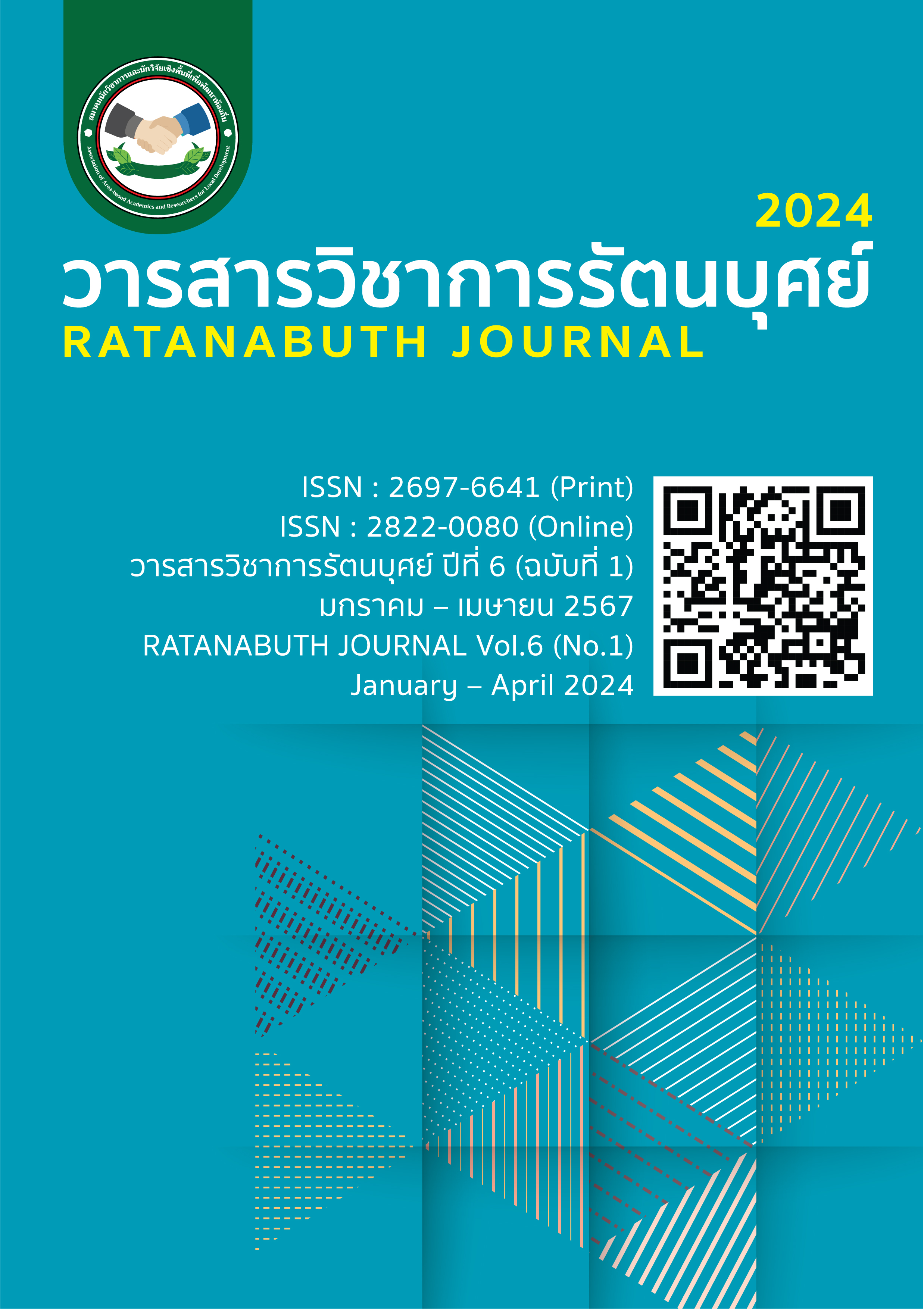การเพิ่มประสิทธิภาพการศึกษาผ่านกระบวนการนิเทศแบบพี่เลี้ยง Enhancing Educational Effectiveness through Coaching Supervision
Main Article Content
บทคัดย่อ
การนิเทศการศึกษาแบบพี้เลี้ยงทำหน้าที่เป็นองค์ประกอบสำคัญในแนวการพัฒนาทางวิชาชีพ โดยเฉพาะอย่างยิ่งภายในสภาพแวดล้อมทางการศึกษา ประกอบด้วยกระบวนการที่มีโครงสร้างซึ่งมุ่งเป้าไปที่การสนับสนุนและเพิ่มประสิทธิภาพของพี่เลี้ยงด้านการศึกษาผ่านการสนทนาแบบไตร่ตรอง การพัฒนาทักษะ และข้อเสนอแนะอย่างต่อเนื่อง การศึกษาครั้งนี้มีวัตถุประสงค์เพื่ออธิบายบทบาทและผลกระทบของการนิเทศการศึกษาแบบพี่เลี้ยงภายในสถานศึกษา การดำเนินการศึกษาครั้งนี้ใช้วิธีการรวบรวมและวิเคราะห์วรรณกรรมที่เกี่ยวข้องกับการนิเทศการฝึกสอนและผลกระทบต่อประสิทธิผลทางการศึกษา ผลการศึกษา พบว่า รูปแบบและแนวทางการนิเทศแบบพี่เลี้ยง จำแนกอออกเป็น (1) รูปแบบการนิเทศแบบดั้งเดิม ประกอบด้วย การนิเทศแบบสะท้อนกลับ การนิเทศการพัฒนา (2) แนวทางร่วมสมัย ประกอบด้วย การนิเทศที่มุ่งเน้นโซลูชัน การนิเทศการเปลี่ยนแปลง อย่างไรก็ตามผลการศึกษาบ่งชี้ว่าการศึกษาระบุการนิเทศการให้คำปรึกษาสองประเภท: โมเดลดั้งเดิม ซึ่งรวมถึงแนวทางการไตร่ตรองและการพัฒนา และแนวทางร่วมสมัย ซึ่งรวมถึงการกำกับดูแลที่มุ่งเน้นโซลูชันและการนิเทศการเปลี่ยนแปลง หมวดหมู่เหล่านี้แสดงถึงกรอบการทำงานและแนวทางต่างๆ ที่ใช้ในการให้คำปรึกษาด้านการกำกับดูแลเพื่อสนับสนุนการเติบโตและการพัฒนาทางวิชาชีพ
Article Details

อนุญาตภายใต้เงื่อนไข Creative Commons Attribution-NonCommercial-NoDerivatives 4.0 International License.
เอกสารอ้างอิง
Bachkirova, T. (2011). Developmental coaching: Working with the self. McGraw-Hill Education (UK).
Bachkirova, T., Cox, E., & Clutterbuck, D. (Eds.). (2014). The Complete Handbook of Coaching. SAGE Publications.
Bandura, A. (1977). Social learning theory. Prentice-Hall.
Barrett, M., & Brock, D. (2004). Coaching in Organizations: A Journey of Transformation. In M. Hughes, H. C. L. Ginnett, & G. Curphy (Eds.), Leadership: Enhancing the Lessons of Experience (5th ed., pp. 485–498). McGraw-Hill.
Bass, B. M., & Riggio, R. E. (2006). Transformational leadership (2nd ed.). Routledge.
Berg, I. K. (1999). The varieties of constructivism: Multiple perspectives and directions for the future. Journal of Systemic Therapies, 18(2), 128-139.
Bergquist, W. (2005). Helping People Change: Coaching with Compassion for Lifelong Learning and Growth. Praeger.
Campbell, J. (2013). Understanding Supervision and the PhD: A Student Perspective. In L. McAlpine & C. A. Amundsen (Eds.), Doctoral Education: Research-Based Strategies for Doctoral Students, Supervisors and Administrators (pp. 141–156). Springer.
Carroll, M. (2006). Handbook of counseling supervision. Psychology Press.
Cox, E., Bachkirova, T., & Clutterbuck, D. (2014). The complete handbook of coaching. SAGE.
de Shazer, S. (1985). Keys to solution in brief therapy. W. W. Norton & Company.
Eraut, M. (2007). Learning from Other People in the Workplace. Oxford University Press.
Franklin, C. (2011). Solution-focused brief therapy: A handbook of evidence-based practice. Oxford University Press.
Franklin, C. (2019). Solution-focused coaching: Mentoring for change. Routledge.
Gingerich, W. J., & Peterson, L. T. (2013). Effectiveness of solution-focused brief therapy: A systematic qualitative review of controlled outcome studies. Research on Social Work Practice, 23(3), 266–283.
Grant, A. M., & Stober, D. R. (2006). Toward a definition of wisdom. Research in Human Development, 3(2-3), 151-171.
Gyllensten, K., & Palmer, S. (2007). The coaching relationship: Putting people first. Routledge.
Hargreaves, A., & Fullan, M. (2012). Professional Capital: Transforming Teaching in Every School. Teachers College Press.
Hawkins, P., & Shohet, R. (2012). Supervision in the helping professions (4th ed.). McGraw-Hill Education.
Hawkins, P., & Smith, N. (2006). Coaching, mentoring and organizational consultancy: Supervision and developmental dialogue. McGraw-Hill Education.
Ingersoll, R. M., & Strong, M. (2011). The Impact of Induction and Mentoring Programs for Beginning Teachers: A Critical Review of the Research. Review of Educational Research, 81(2), 201–233. https://doi.org/10.3102/0034654311403323
Inskipp, F., & Proctor, B. (2001). Making the most of supervision. In P. L. Whitmore, D. Kauffman, & R. A. Hart (Eds.), Handbook of coaching psychology: A guide for practitioners (pp. 238-260). Routledge.
Jarvis, P. (2006). Towards a comprehensive theory of human learning. Routledge.
Joyce, B., & Showers, B. (2002). Student Achievement through Staff Development. (3rd ed.). Association for Supervision and Curriculum Development.
Kilburg, R. R. (1996). Toward a conceptual understanding and definition of executive coaching. Consulting Psychology Journal: Practice and Research, 48(2), 134-144.
Kilburg, R. R. (2000). Executive coaching: Developing managerial wisdom in a world of chaos. American Psychological Association.
Kilburg, R., & Diedrich, R. (1997). The Long March: The evolution of training in professional psychology. Professional Psychology: Research and Practice, 28(2), 117-124.
Knight, J. (2007). Instructional Coaching: A Partnership Approach to Improving Instruction. Corwin Press.
Knowles, M. S. (1980). The modern practice of adult education: From pedagogy to andragogy. Cambridge Adult Education.
Knowles, M. S., Holton III, E. F., & Swanson, R. A. (2014). The adult learner: The definitive classic in adult education and human resource development. Routledge.
Kolb, A. Y., & Kolb, D. A. (2009). Experiential learning theory: A dynamic, holistic approach to management learning, education and development. In S. Armstrong & C. Fukami (Eds.), Handbook of management learning, education and development (pp. 42-68). SAGE.
Kolb, D. A., & Kolb, A. Y. (2009). The learning way: Meta-cognitive aspects of experiential learning. Simulation & Gaming, 40(3), 297-327.
Lawrence, P. (2009). Coaching and Mentoring: A Critical Text. SAGE Publications.
Lawrence, P., & O'Connell, B. (2016). Coaching in three dimensions: Meeting the challenges of a complex world. Routledge.
McMahon, G. T., & Patton, W. (2002). Supervision: Reconsidering the Concept and Reclaiming Its Potential for Professional Practice. Australian Journal of Guidance and Counselling, 12(1), 1–10. https://doi.org/10.1017/jgc.2011.23
Neimeyer, G. J., & Mahoney, M. J. (1995). Constructivism in psychotherapy. American Psychological Association.
Passmore, J., & Fillery-Travis, A. (2011). Coaching psychology: Meta-theoretical perspectives and applications in multi-cultural contexts. In S. Palmer & A. Whybrow (Eds.), Handbook of coaching psychology: A guide for practitioners (pp. 54-77). Routledge.
Passmore, J., & Lai, Y. (2019). Supervision: A relational approach. In S. Palmer & T. Whybrow (Eds.), The Handbook of Coaching Psychology: A Guide for Practitioners (2nd ed., pp. 105-120). Routledge.
Raelin, J. A. (2008). Work-Based Learning: Bridging Knowledge and Action in the Workplace. Jossey-Bass.
Schön, D. A. (1983). The reflective practitioner: How professionals think in action. Basic books.
Schon, D.A. (1983). The Reflective Practitioner: How Professionals Think in Action. Basic Books, New York.
Stober, D. R., & Grant, A. M. (2006). Evidence based coaching handbook: Putting best practices to work for your clients. John Wiley & Sons.
Stoltenberg, C. D., & Delworth, U. (1987). Supervising Counselors and Therapists: A Developmental Approach. Jossey-Bass.
Stout-Rostron, S. (2012). Business coaching international: Transforming individuals and organizations. Karnac Books.
Stout-Rostron, S. (2014). Integrative coaching: An expanded view of coaching. Routledge.
Sutherland, P. (1992). Cognitive development today: Piaget and his critics. London: Paul Cuapman.


